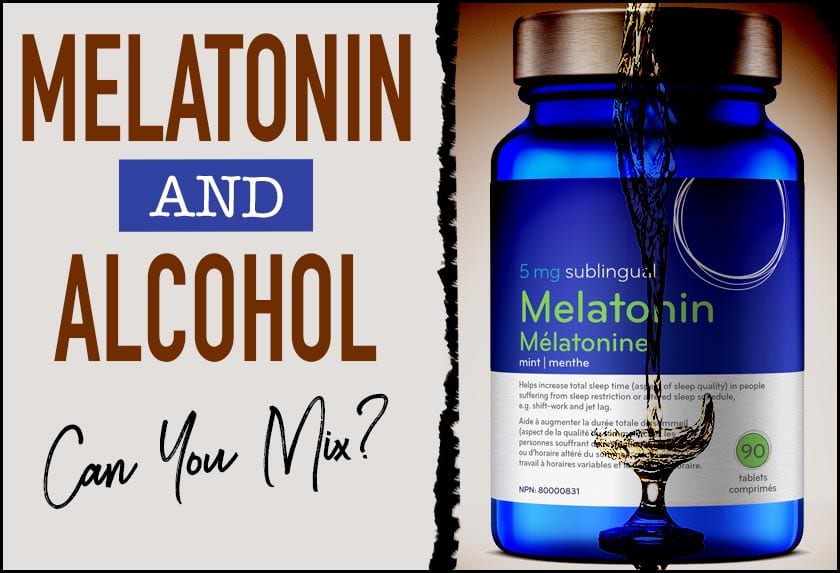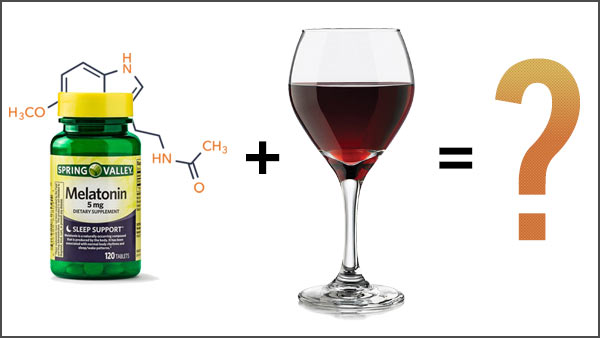Mixing Melatonin and Alcohol: Is it Safe?
Are you regularly having trouble sleeping? If so, you’re not alone. According to various studies, the prevalence of insomnia—defined as difficulty with sleep quality, consolidation, duration, and initiation—ranges from 10% to 60%, depending on the demographics of a population. This is where we dive into melatonin and alcohol.
Anyone with sleep problems is typically well aware of two terms: “Alcohol” and “Melatonin Supplements”. Both substances individually have been used as sleep aids. With this in mind, someone might assume that mixing alcohol and melatonin would double their sleep-inducing abilities.
Sure, it’s widely known that alcohol tends to interfere with the function and potency of medications—and thus should not be mixed with other drugs. But then again; most people don’t consider natural supplements such as melatonin as medication. This begs the question—Can you safely mix melatonin and alcohol?
As we will highlight in this article, mixing natural supplements with alcohol can be just as dangerous as prescribed medication. Read on for more on the risks of mixing melatonin and alcohol—including how they individually affect sleep patterns and their interaction when combined.
What Is Melatonin? – Functions, Side Effects, and Risk of Overdose
Melatonin is a hormone produced in the brain. It helps control your circadian rhythms (the body’s biological clock)—which in turn helps moderate several bodily functions.
Think of circadian rhythms as the biological process that tells you when to sleep at night and when to wake up in the morning. They are also known as daily rhythms or the sleep/wake cycle.
Melatonin is naturally produced in the pineal gland which can be found in the brain. Light inhibits its release; darkness stimulates it. It’s also found in some food—and as an over-the-counter supplement. It’s known to help ease symptoms of Alzheimer’s disease, tinnitus, and radiation exposure. It’s often given to children with Attention Deficit Hyperactivity Disorder, to help them sleep.
Melatonin is not just used to regulate sleep. It’s also effective as an antioxidant and anti-inflammatory substance. It’s known to help boost the immune system—although researchers are not 100% sure of how it does.
Some sources also claim that it can regulate fat cells, help with neurodegenerative diseases and, acute cases of pancreatitis. Melatonin can be found within your cardiovascular system, intestine, liver, and kidneys.
Side Effects and Risks of Melatonin
Although most people assume that melatonin and other natural supplements are generally safe, it’s crucial to learn about their interactions, effectiveness, use, and any potential risks.
In the case of melatonin, the supplement is not associated with major complications. But due to its accessibility and perceived safety, it’s easy for users to exceed the recommended dosage (0.3-1 mg).
Going past the proper dosage may upset the body’s rhythms and natural processes, leading to minor side effects such as:
- Sleepiness, sometimes during daytime after you’ve woken up
- Nausea
- Dizziness or disorientation
- Occasional headaches
- Mild anxiety
- Irritability
It’s also worth noting that melatonin may interact and affect the effectiveness of various medications, including:
- Immunosuppressants
- Diabetes medications
- Contraceptives
- Anticonvulsants
- Blood pressure medication
- Blood thinners such as Anticoagulants
(PS: Melatonin is regulated by the U.S. Food and Drug Administration (FDA) as a dietary supplement—meaning it’s not held to the same strict standards as prescription drugs. For this reason, it’s advisable to acquire the supplement from a reputable source).
What You Need to Know About Alcohol and Sleep
Did you know that around 20% of Americans use alcohol as the go-to sleeping aid? This is largely attributed to the ability of alcohol to reduce the time it takes to drift off.
But while a drink or two may reduce sleep onset latency, it also disrupts the entire night of sleep. Alcohol interferes with your body’s ability to coordinate circadian rhythm activity, affecting sleep and other processes such as mood, metabolisms, and even immunity.
According to a study appearing in Chronobiology International, indulging in a moderate dose of alcohol before bedtime can reduce the production of melatonin by roughly 20%. As discussed earlier, melatonin is responsible for regulating sleep-wake cycles by regulating circadian rhythms.
This means that alcohol directly diminishes your body’s ability to respond to light and darkness cues—hence negatively affecting your sleep quality and patterns. Moreover, research suggests that the negative effects of alcohol on circadian rhythms may persist days after your last drink.
Risks of Alcohol on Sleep Quantity and Quality
Alcohol in your system at bedtime increases the risk of next-day fatigue, diminished sleep quality, restlessness, and light sleep. According to the book “Sleep Disorders and Sleep Deprivation” by the Institute of Medicine (IOM), alcohol alters the natural flow of sleep stages as shown below:
- Studies show that people spend less time in REM (rapid eye movement) sleep during the 1st half of the night as the body metabolizes alcohol consumed. Each stage of sleep is finely calibrated/biologically driven—and any alterations may be detrimental. For example, REM sleep helps restore brain chemistry, stimulate the nervous system, and form new memories.
- Later in the night, alcohol causes the body to undergo a “rebound effect”—whereby you experience frequent awakenings. This interrupts the quality and flow of sleep.
- According to a study published in the Journal of Neurology, Neurosurgery, and Psychiatry, alcohol may lead to excessive relaxation of neck and head muscles—increasing the risk of sleep-disordered breathing and snoring.
- Some studies suggest that alcohol consumption may trigger or aggravate existing sleep disorders such as Obstructive Sleep Apnea.
- Alcohol leads to more bathroom visits at night, hence interfering with sleep quality.
What Happens When You Mix Melatonin and Alcohol?
Alcohol mixed with melatonin side effects can disrupt your sleep patterns to the extent that you are confused, absent-minded, and at risk of being involved in mild to serious accidents. Melatonin and Alcohol are both sedatives that can cause several unwanted side effects when combined.
Some of the effects of mixing melatonin with alcohol include:
- Drowsiness and poor sleep with or without intense dreams
- Breathing problems
- Dizziness and/or fainting
- Irritability and increased anxiety
- Inability to focus or concentrate
- Redness in the face
- Fast or irregular heartbeat
- Swelling in your ankles and feet
- Shivering or feeling abnormally cold
Answers to Common Melatonin Questions
Taking melatonin with other drugs can reduce the effectiveness of them so ensure that you discuss your options with your Doctor.
Is Melatonin Safe?
If taken as prescribed and under the care of your doctor, melatonin can be a safe and effective treatment for sleep disorders. Monitor any side effects you may have and if you experience breathing difficulties, contact your doctor.
How Much Melatonin Should I Take?
Your doctor will advise you to start with a small dose to determine which—if any—side effects you may experience. Any side effects should pass quickly—and if they don’t, you should contact your medical professional for advice.
Can I Overdose on Melatonin?
Yes. A melatonin overdose can produce symptoms such as:
- Irritability
- Headaches
- Nausea
- Diarrhea
- Dizziness
- Anxiety
While these symptoms may seem relatively harmless if melatonin use continues, there is a high risk of changes in blood pressure which can lead to strokes and other serious conditions.
Is Melatonin Addictive?
At the time of this writing, there wasn’t a conclusive study linking melatonin to addiction. It’s not habit-forming, it doesn’t cause withdrawal symptoms, and users don’t build a tolerance to the supplement. However, keep in mind that research on the topic is limited and the long-term safety of melatonin is not clear.
Can I Take Birth Control Medication with Melatonin?
Some birth control medications can increase your body’s natural melatonin production. If you are taking a melatonin supplement, this can lead to a melatonin overdose. Consult your doctor about other birth control options or about finding an alternative to melatonin.
According to the U.S. National Center for Complementary and Integrative Health (NCCIH), “As with all dietary supplements, people who are taking medicine should consult their health care providers before using melatonin. In particular, people with epilepsy and those taking blood thinner medications need to be under medical supervision when taking melatonin supplements.”
Is it Safe to Take Melatonin and Alcohol While Pregnant?
A significant number of women struggle with some degree of sleep problems during pregnancy. At times, these sleep disturbances may be severe enough to warrant an intervention. Owing to concerns over the healthy development of the unborn baby, most women inquire about the efficacy and safety of natural sleeping aids such as melatonin.
But while melatonin is produced naturally in the body and it has been shown to have beneficial effects on pregnancies, caution should be taken when it comes to over-the-counter supplements. Especially since the dosage available in stores often exceeds the amount normally produced by the body.
Moreover, research on the safety of melatonin supplements for pregnant and breastfeeding women is limited and largely unreliable. For this reason, it’s important to consult your doctor—particularly if you’re on any other medication.
With regard to alcohol, it’s NOT SAFE for pregnant or breastfeeding women. According to the Centers for Disease Control and Prevention (CDC), “Drinking alcohol during pregnancy can cause miscarriage, stillbirth, and a range of lifelong physical, behavioral, and intellectual disabilities. These disabilities are known as fetal alcohol spectrum disorders (FASDs).” There is no safe dosage nor a safe time to indulge in alcohol consumption during pregnancy.
Alternative and Safe Remedies to Melatonin and Alcohol that Help with Sleep Problems
What is your go-to sleep aid? If it’s alcohol, by now you should be aware that it has detrimental effects on sleep quality. If anything, it might be a sign that you’re suffering from a substance abuse disorder. In such a case, you should seek alcoholism treatment from addiction recovery experts.
Instead of alcohol, consider natural sleep aids that offer little-to-no unwanted side effects such as lavender, chamomile, or healthy doses of melatonin. You can also exercise some supportive lifestyle changes like creating a bedtime routine, meditation, and steering clear of devices that emit blue light (e.g., smartphones and computers).
Melatonin and Alcohol Are Not a Good Mix
All things considered, is it safe to take melatonin and alcohol? The short, resounding answer is NO!
Any substance, natural or otherwise has the potential to become dangerous in large doses and we can never be 100% sure just how our bodies will react to things. This is especially relevant for melatonin due to its limited FDA regulation and risk of overdose. Sure, the side effects of melatonin are not necessarily life-threatening—but an overdose may bring unwanted results.
Drugs of any sort never mix well with alcohol—and melatonin is not an exception. It also pays to remember that most of today’s drugs were created as synthetic versions of natural substances.
The side effects of taking melatonin and alcohol can lead to potentially dangerous consequences such as losing consciousness and the risk of accidents. Not to mention the fact that the risks of alcohol consumption exceed its perceived benefits.
With this in mind, the safest bet to avoid the negative effects of mixing melatonin and alcohol is rather straightforward – watch your melatonin dosage and abstain from alcohol altogether!






